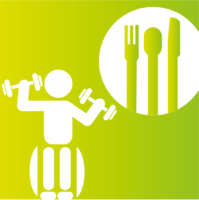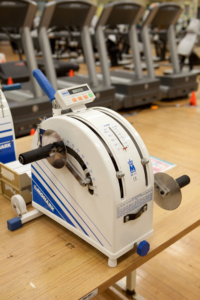
Effects of a single exercise session or meal on physical and mental health of people with spinal cord injury: a case series study
This study aims to identify how diet and exercise may affect inflammation in persons living with a spinal cord injury (SCI).
The purpose of this research is three-fold; (1) to understand the effects a single meal on the inflammatory processes of the body, (2) to understand the effects of a single bout of exercise on inflammation, and (3) to better understand the relationships between inflammation and psychosocial outcomes (i.e., neuropathic pain, perceived stress, and affect).
Participants will be asked to visit the Health and Wellness Laboratory at UBC Okanagan 4 times.
Visit 1: Familiarization. This visit will include: a) VO2 max test, b) questionnaire administration, c) cognitive test completion.
Visit 2,3,4: Randomized – Sample below
Sample Visit 2: Exercise Day. This study day will include 30 minutes of arm-crank ergometry exercise at 60% VO2 max. Participants will answer pain, and mood questionnaires pre-, immediately post-, and 90 minutes post-exercise completion. ~30 ml blood will be drawn at the same aforementioned timepoints.
Sample Visit 3: Control Day. This visit is identical to the Exercise Testing Visit, but instead of exercise, you will watch a 30-minute Planet Earth documentary or similar activity.
 Sample Visit 4: Diet Day. Participants will eat a high fat-high carbohydrate meal provided by the research team. ~30 ml of blood will be drawn at baseline, immediately following meal consumption, and 90 minutes post meal consumption.
Sample Visit 4: Diet Day. Participants will eat a high fat-high carbohydrate meal provided by the research team. ~30 ml of blood will be drawn at baseline, immediately following meal consumption, and 90 minutes post meal consumption.
Why should you participate in this study?
Through participation in this study, participants may gain insight into their personal responses to exercise and high fat/high carbohydrate diet in relation to their neuropathic pain sensations/psychological outcomes. Given the minimal understanding of neuropathic pain (and its diurnal nature), any additional
information and general understanding may positively impact well-being and quality of life for persons
with SCI.
You may be eligible to participate in this study if you
- Are 18+ years of age
- Experience neuropathic pain sensations
- Read, speak, understand English
- Have been diagnosed with a SCI for at least 1 year
- Participate in a high intensity sport (e.g., wheelchair rugby, wheelchair racing, hand cycle racing, para alpine skiing), or train at a high intensity at least 3 times per week.
You may not be eligible to participate in this study if you
- Have been diagnosed with a metabolic disorder (e.g., diabetes, metabolic syndrome, hypothyroidism, or any other condition known to affect metabolism).
- Are currently an elite athlete participating in sport at a national/international level.
- Are unable to refrain from anti-inflammatory medications (e.g. Ibuprofen, Naproxen, Tylenol) for at least 24 hours before each trial day.
- Are pregnant
Time commitment
Four visits to the Health and Wellness Laboratory of the SCI Action Canada Lab. Each visit will require ~2-2.5 hours to complete. Total time commitment: 8-10 hours.
Compensation for participation
Up to $150 for full study completion. Parking and travel ($0.42/km) will also be compensated
Where will the study take place?
UBC Okanagan Campus (1238 Discovery Ave, Kelowna BC)
For more information or to sign up to participate
please contact the study coordinator, Kendra Todd, by email or call (519) 546-3496
This study involves physical activity
This study involves non-invasive procedures (ie ultrasound, blood pressure)
This study involves experimental medical procedures
This study involves taking a survey or being interviewed

